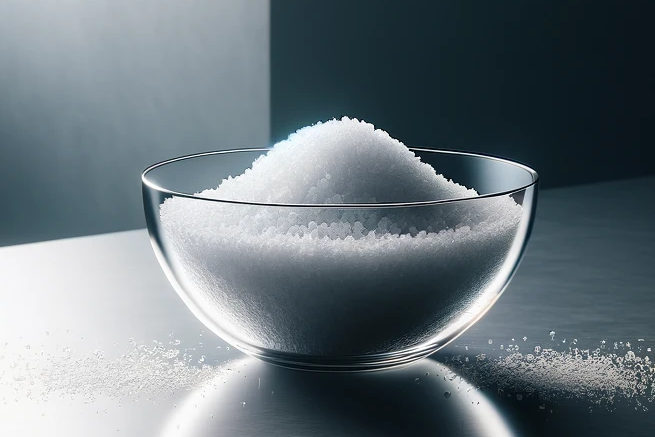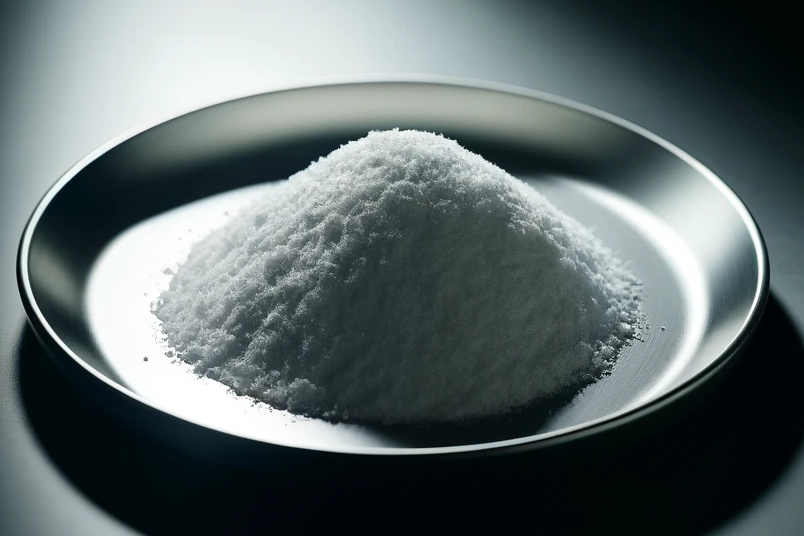Sodium iodide

Sodium iodide, an element that often goes unnoticed, plays a crucial role in maintaining the health of our dogs, particularly with regards to their thyroid function. In this comprehensive article, we explore the nature of sodium iodide, its importance to canine health and look at the benefits and potential drawbacks of its use in dog nutrition.
What is sodium iodide?
Sodium iodide (NaI) is an iodine salt that is rarely found in its pure form in nature, but plays a role in many aspects of human and animal nutrition. As a source of iodine, sodium iodide supports thyroid function by contributing to the production of thyroid hormones, which in turn are essential for the regulation of metabolism.
The invisible helper: benefits of sodium iodide
Support for thyroid health
Metabolic regulation: Adequate iodine intake from sodium iodide is crucial for the production of thyroid hormones, which regulate metabolism and are important for the growth and development of dogs.
Prevention of disease: Adequate iodine supplementation can help prevent thyroid disease such as hypothyroidism, a condition that can lead to weight gain, lethargy and other health problems.
Improve overall health
Skin and coat health: Sodium iodide may indirectly contribute to skin and coat health by supporting normal thyroid function.
Reproductive health: For breeding dogs, adequate iodine supply is important to ensure reproductive health and puppy development.
Possible downsides: Disadvantages and risks
Excessive iodine intake
Iodine toxicity: Excess iodine, possibly due to excessive sodium iodide intake, can lead to iodine toxicity, which can damage the thyroid gland and lead to hyperthyroidism.
Sensitivity and allergies: Some dogs may be sensitive to high levels of iodine, which can lead to skin irritation or other allergic reactions.
Imbalance in the diet
Nutrient interactions: An unbalanced intake of sodium iodide can interact with the intake of other important minerals and lead to an imbalance.
Finding a balanced ratio
Consider individual needs
The ideal iodine intake varies depending on the dog's age, size, breed and state of health. A personalized diet tailored to your dog's specific needs is essential.
Quality-conscious food selection
Pay attention to the ingredients and nutritional composition of the dog food. High-quality food usually contains a balanced ratio of sodium iodide and other minerals.
Balance is the key
Sodium iodide plays an essential role in the nutrition and health of our dogs. The benefits range from supporting thyroid function to preventing disease and promoting overall health. However, the use of sodium iodide in dog nutrition requires careful management to avoid overdosing and possible side effects. A balanced diet tailored to your dog's individual needs, along with regular health checks, will ensure that your dog enjoys all the benefits of sodium iodide without the risks.
If you notice any signs of hypersensitivity or poisoning in your dog, you should see your vet immediately. We are not a substitute for a vet, but we try to be as accurate as possible. Every dog reacts differently and we recommend you get a second opinion or consult your vet if in doubt.
Stay healthy and take good care of your four-legged friend!😊
Similar to Sodium iodide
Potassium iodide (KI) is a chemical compound of potassium and iodine. It is an important component in the diet that plays a key role in the function of the thyroid gland. The thyroid gland uses...
Sodium chloride fulfills several important functions in the dog's body. Firstly, it is involved in the production of hydrochloric acid in the stomach, which is necessary for digestion. Secondly, it...
Potassium chloride (KCl) is the potassium salt of hydrochloric acid. It forms colorless, salty-bitter tasting crystals that dissolve well in water. Potassium chloride is approved as a food additive...
Potassium bromide (KBr) is a salt of the bromide ion and has been used in medicine to treat epilepsy since the late 19th century. In veterinary medicine, it has established itself as an effective...



